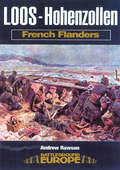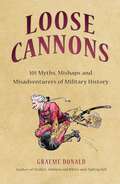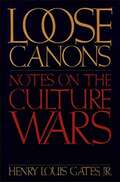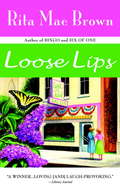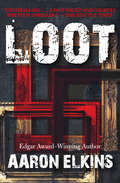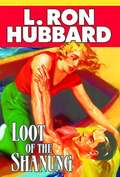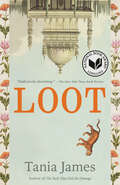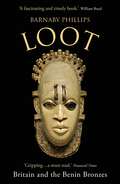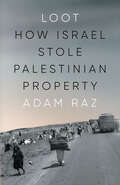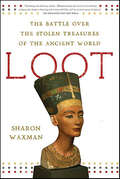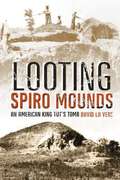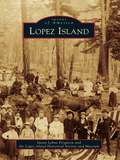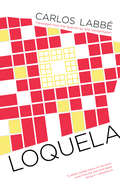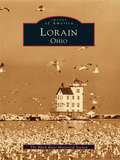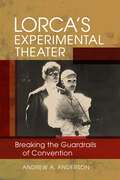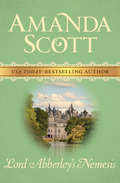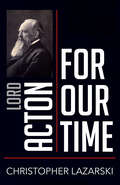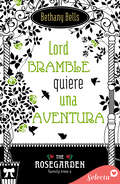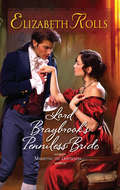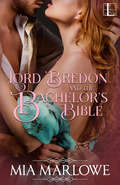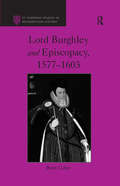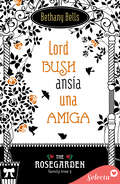- Table View
- List View
Loos: French Flanders (Battleground Europe)
by Andrew RawsonIn September 1915 Kitcherner's men were in action for the first time in the largest offensive of the year. Using gas, British troops managed to open a three mile gap in the German line. However, misuse of the reserves allowed the chance of success to pass by. In the following struggle for Hohenzollern Redboubt, the British were defeated time after time by superior weapons and tactics. For the first time visitors will be able to explore this key battle, a battle that cost the BEF over 50,000 casualties.
Loose Cannons: 101 Things They Never Told You About Military History
by Graeme DonaldFrom the author of Sticklers, Sideburns, and Bikinis comes this funny, often irreverent look at two thousand years of lies, inaccuracies, propaganda, deceit, downright foolishness, and little-known facts from the ars militaria. On Hitler: "[No one] ever produced 'proof' of Hitler having won the Iron Cross, Second Class without which the First Class could not be awarded. He was a liar, but his favorite WWI yarn, about his life being spared by a British soldier who had him dead in his sights, is unfortunately true. It seems we have Private Henry Tandy VC, then of the Green Howards, to thank for all the fun of Round 2 with Germany." On Che Guevara: "The darling of week-end rebels and champagne socialists, Guevara continues to be lauded by the intellectually bankrupt who sport his image on T-shirts, making Guevara the only racist, mass murderer to become a fashion-accessory. He neither lived nor died a hero and almost everything trumpeted about him is false." On the Lusitania: She was not an American liner; she was not sunk on her maiden voyage; she was not an 'innocent' sunk without warning by the nasty Germans; the incident was not responsible for America's entry into WW1, and as for British connivance into her sinking, the jury is still out on that. On breast enhancement surgery: One of the more unusual 'developments' from WWII, to say the least, but modern breast enhancement techniques were a direct result of the American occupation of post-war Japan.
Loose Canons: Notes on the Culture Wars
by Henry Louis GatesMulticulturalism. It has been the subject of cover stories in Time and Newsweek , as well as numerous articles in newspapers and magazines around America. It has sparked heated jeremiads by George Will, Dinesh D'Sousa, and Roger Kimball. It moved William F. Buckley to rail against Stanley Fish and Catherine Stimpson on "Firing Line." It is arguably the most hotly debated topic in America today--and justly so. For whether one speaks of tensions between Hasidim and African-Americans in Crown Heights, or violent mass protests against Moscow in ethnic republics such as Armenia, or outright war between Serbs and Croats in Yugoslavia, it is clear that the clash of cultures is a worldwide problem, deeply felt, passionately expressed, always on the verge of violent explosion. <p><p>Problems of this magnitude inevitably frame the discussion of "multiculturalism" and "cultural diversity" in the American classroom as well. In Loose Canons , one of America's leading literary and cultural critics, Henry Louis Gates, Jr., offers a broad, illuminating look at this highly contentious issue. Gates agrees that our world is deeply divided by nationalism, racism, and sexism, and argues that the only way to transcend these divisions--to forge a civic culture that respects both differences and similarities--is through education that respects both the diversity and commonalities of human culture. His is a plea for cultural and intercultural understanding. (You can't understand the world, he observes, if you exclude 90 percent of the world's cultural heritage.) <p><p>We feel his ideas most strongly voiced in the concluding essay in the volume, "Trading on the Margin." Avoiding the stridency of both the Right and the Left, Gates concludes that the society we have made simply won't survive without the values of tolerance, and cultural tolerance comes to nothing without cultural understanding. Henry Louis Gates is one of the most visible and outspoken figures on the academic scene, the subject of a cover story in The New York Times Sunday Magazine and a major profile in The Boston Globe , and a much sought-after commentator. And as one of America's foremost advocates of African-American Studies (he is head of the department at Harvard), he has reflected upon the varied meanings of multiculturalism throughout his professional career, long before it became a national controversy. <p><p>What we find in these pages, then, is the fruit of years of reflection on culture, racism, and the "American identity," and a deep commitment to broadening the literary and cultural horizons of all Americans.
Loose Lips (Runnymede #3)
by Rita Mae BrownIf you crossed Mitford, North Carolina, with Peyton Place, you might come up with Runnymede, Maryland, the most beguiling of Southern towns. In Loose Lips, Rita Mae Brown revisits Runnymede and the beloved characters introduced in Six of One and Bingo, serving up an exuberant portrayal of small-town sins and Southern mores, set against a backdrop of homefront life during World War II. "I'm afraid life is passing me by," Louise told her sister. "No, it's not," Juts said. "Life can't pass us by. We are life." In the picturesque town of Runnymede, everyone knows everyone else's business, and the madcap antics of the battling Hunsenmeir sisters, Julia (Juts) and Louise, have kept the whole town agog ever since they were children. Now, in the fateful year of 1941, with America headed for war, the sisters are inching toward forty... and Juts is unwise enough to mention that unspeakable reality to her sister. The result is a huge brawl that litters Cadwalder's soda fountain with four hundred dollars' worth of broken glass. To pay the debt, the sisters choose a surprisingly new direction. Suddenly they are joint owners of The Curl 'n' Twirl beauty salon, where discriminating ladies meet to be primped, permed, and pampered while dishing the town's latest dirt. As Juts and Louise become Runnymede's most unlikely new career women, each faces her share of obstacles. Restless Juts can't shake her longing for a baby, while holier-than-thou Louise is fit to be tied over her teenage daughter's headlong rush toward scandal. As usual, the sisters rarely see eye to eye, and there are plenty of opinions to go around. Even the common bond of patriotic duty brings wildly unexpected results when the twosome joins the Civil Air Patrol, watching the night sky for German Stukas. But loose lips can sink even the closest relationships, and Juts and Louise are about to discover that some things are best left unsaid. Spanning a decade in the lives of Louise, Juts, and their nearest and dearest, including the incomparable Celeste Chalfonte, Loose Lips is an unforgettable tale of love and loss and the way life can always throw you a curveball. By turns poignant and hilarious, it is deepened by Rita Mae Brown's unerring insight into the human heart.
Loose-leaf Version for A History of Western Society, Value Edition, Volume I
by John P. Mckay Clare Haru Crowston Merry E. Wiesner-Hanks Joe PerryPraised by instructors and students alike for its readability and attention to everyday life, A History of Western Society, Value Edition offers the full narrative of the parent text in a two-color, trade-sized text with select images and maps at an affordable price. This edition includes many tools to engage today's students and save instructors time, five chapters devoted to the lives of ordinary people that make the past real and relevant, and the best and latest scholarship throughout. Enhanced with a wealth of digital content in LaunchPad, the value edition provides easily assignable options for instructors and novel ways for students to master the content. Integrated with LearningCurve, an adaptive online resource that helps students retain the material and come to class prepared.
Loose-leaf Version for A History of Western Society, Value Edition, Volume II
by John P. Mckay Clare Haru Crowston Merry E. Wiesner-Hanks Joe PerryPraised by instructors and students alike for its readability and attention to everyday life, A History of Western Society, Value Edition offers the full narrative of the parent text in a two-color, trade-sized text with select images and maps at an affordable price. This edition includes many tools to engage today's students and save instructors time, five chapters devoted to the lives of ordinary people that make the past real and relevant, and the best and latest scholarship throughout. Enhanced with a wealth of digital content in LaunchPad, the value edition provides easily assignable options for instructors and novel ways for students to master the content. Integrated with LearningCurve, an adaptive online resource that helps students retain the material and come to class prepared.
Loot
by Aaron ElkinsIn April 1945, The Nazis, reeling and near defeat, frantically work to hide the huge store of art treasures that Hitler has looted from Europe. Truck convoys loaded with the cultural wealth of the Western world pour in an unending stream into the compound of the vast Altaussee salt mine high in the Austrian Alps. But with the Allies closing in, the vaunted efficiency of the Nazis has broken down. At Altaussee, all is tumult and confusion. In the commotion a single truck, its driver, and its priceless load of masterpieces vanish into a mountain snowstorm.Half-a-century later, in a seedy Boston pawnshop, ex-curator Ben Revere makes a stunning discovery among the piles of junk: a Velazquez from the legendary Lost Truck. But with it come decades of secrets, rancor, and lies, and the few who know of the painting's existence have their lives snuffed out one by one by an unknown assassin. Revere must travel back to the grand cities of Europe to unravel the tangled history of the lost truck and its treasures before fifty years of hatred, greed, and retribution catch up with him.
Loot of the Shanung
by L. Ron HubbardStop the presses! One hundred thousand dollar reward offered for the return of George Harley Rockham! That's more than enough to turn Shanghai newspaperman Jimmy Vance's head. Throw in the gorgeous dame who's offering the reward--Rockham's daughter Virginia--and he might lose his head altogether. As fast-talking as Jimmy Stewart in The Philadelphia Story, Vance jumps at the chance . . . the money . . . and the girl.But as Jimmy quickly discovers, there are several billion reasons to watch his back. Because that's how much Rockham is worth, and there are some very hard cases out there willing to kill to separate the old man from his money.Next thing Jimmy knows, Virginia's tied to a chair, and he's got a couple of guns pointed at his head. But it'll take more than a little rope and a couple of firearms to keep this reporter down. The truth is tied to the mysterious fate of a steamship named Shanung--and what Jimmy finds could be the biggest story of his life . . . if he lives to tell it. In the issue of Smashing Novels where this story first appeared the editor wrote: "Loot of the Shanung is a soul-stirring tale of the China Sea, a story of modern piracy set in the Far East. L. Ron Hubbard wrote it. He knows China. He has been there. He traveled through the country and met the people and observed their customs. Smashing Novels will have other stories from him--stories of far-off places and little known people. He knows of what he writes."
Loot: A novel
by Tania JamesLONGLISTED FOR THE NATIONAL BOOK AWARD IN FICTION • A spellbinding historical novel set in the eighteenth century: a hero&’s quest, a love story, the story of a young artist coming of age, and an exuberant heist adventure that traces the bloody legacy of colonialism across two continents and fifty years.&“Addictively absorbing.&” —The New York Times Book Review This wildly inventive, irresistible feat of storytelling from a writer at the height of her powers is "an expertly-plotted, deeply affecting novel about war, displacement, emigration, and an elusive mechanical tiger" (Maggie O&’Farrell, best-selling author of Hamnet and The Marriage Portrait). Abbas is just seventeen years old when his gifts as a woodcarver come to the attention of Tipu Sultan, and he is drawn into service at the palace in order to build a giant tiger automaton for Tipu&’s sons, a gift to commemorate their return from British captivity. His fate—and the fate of the wooden tiger he helps create—will mirror the vicissitudes of nations and dynasties ravaged by war across India and Europe.Working alongside the legendary French clockmaker Lucien du Leze, Abbas hones his craft, learns French, and meets Jehanne, the daughter of a French expatriate. When Du Leze is finally permitted to return home to Rouen, he invites Abbas to come along as his apprentice. But by the time Abbas travels to Europe, Tipu&’s palace has been looted by British forces, and the tiger automaton has disappeared. To prove himself, Abbas must retrieve the tiger from an estate in the English countryside, where it is displayed in a collection of plundered art.
Loot: Britain and the Benin Bronzes (Modern Classics Ser.)
by Barnaby Phillips&‘A fascinating and timely book.&’ William Boyd &‘Gripping…a must read.&’ FT In 1897, Britain responded to the killing of a group of officials by razing an empire to the ground. The men had been travelling to the ancient Kingdom of Benin, in what is now Nigeria, when they were ambushed and killed by local soldiers. Just six weeks later, the British had exacted their revenge, set Benin aflame, exiled the king and annexed the territory. They also made off with some of Africa&’s greatest works of art.This is the story of the &‘Benin Bronzes&’, their creation, removal, and what should happen to them now. When first exhibited in London they caused a sensation and helped reshape European attitudes towards Africa, challenging the prevailing view of the continent as &‘backward&’ and without culture. But seeing them in the British Museum today is, in the words of one Benin City artist, like &‘visiting relatives behind bars&’. In a time of fevered debate about the legacies of empire, loot, museums and history, what does the future hold for the Bronzes themselves?
Loot: How Israel Stole Palestinian Property
by Adam RazExiled in 1948, Palestinians were robbed of their private property when looting became weaponizedDuring the 1948 War, Israeli fighters and residents alike plundered Palestinian homes, shops, businesses, and farms. This bitter truth was then suppressed or forgotten over the coming years.Tens of thousands took part in the pillage of Palestinian property, stealing the belongings of their former neighbours. The implications of this mass looting go far beyond the personality or moral fibre of those who took part. Plundering served a political agenda by helping to empty the country of its Palestinian residents. In this context, it was part of the prevailing policy during the war – one designed to crush the Palestinian economy, destroy villages, and to confiscate and sometimes destroy crops and harvests remaining in the depopulated zones.The participating Jewish public became a stakeholder, motivated to prevent Palestinian residents from returning to the villages and cities they had left. These ordinary people were mobilized in the push for the segregation of Jews and Arabs in the early years of statehood.With painstaking original research into primary sources, Adam Raz has brought to light a tragic moment in the history of a conflict that roils the region and the wider world. As the details of the Nakba are understood and documented, redress for Palestinian grievances comes closer to reality.
Loot: The Battle Over the Stolen Treasures of the Ancient World
by Sharon WaxmanA journey across four continents to the heart of the conflict over who should own the great works of ancient artWhy are the Elgin Marbles in London and not on the Acropolis? Why do there seem to be as many mummies in France as there are in Egypt? Why are so many Etruscan masterworks in America? For the past two centuries, the West has been plundering the treasures of the ancient world to fill its great museums, but in recent years, the countries where ancient civilizations originated have begun to push back, taking museums to court, prosecuting curators, and threatening to force the return of these priceless objects.Where do these treasures rightly belong? Sharon Waxman, a former culture reporter for The New York Times and a longtime foreign correspondent, brings us inside this high-stakes conflict, examining the implications for the preservation of the objects themselves and for how we understand our shared cultural heritage. Her journey takes readers from the great cities of Europe and America to Egypt, Turkey, Greece, and Italy, as these countries face down the Louvre, the Metropolitan Museum, the British Museum, and the J. Paul Getty Museum. She also introduces a cast of determined and implacable characters whose battles may strip these museums of some of their most cherished treasures.For readers who are fascinated by antiquity, who love to frequent museums, and who believe in the value of cultural exchange, Loot opens a new window on an enduring conflict.
Looting Spiro Mounds: An American King Tut's Tomb
by David La VereVere (history, U. of North Carolina, Wilmington) recounts the looting of the Spiro Mounds in eastern Oklahoma in 1935, which contained a large amount of pre-Columbian art. He describes the founding and settlement of the area from 800 A.D., the culture and life of the people, and the decline of the chiefdom by 1450 A.D. These chapters are interwoven with the story of how the Pocola Mining Company found the Mounds in the 1930s and looted the objects, the fight with them by U. of Oklahoma's anthropologist Forrest Clements over who had property rights, Works Progress Administration excavation, and past and present theories about Spiro and its people. Annotation ©2007 Book News, Inc., Portland, OR (booknews.com)
Lopez Island
by Lopez Island Historical Society and Museum Susan Lehne FergusonThe story of Lopez Island is a story of community. Skilled, brave, generous people like Sampson Chadwick, Mother Brown, Captain Barlow, and Amelia Davis carved a spirited, nurturing community out of seaside wilderness. Homesteaders cleared forests, built farms, grew food, and raised large families, surviving then thriving together. The hamlets of Port Stanley, Richardson, and Lopez emerged, creating hubs with stores, post offices, and schools as well as thriving fishing, canning, and shipping industries. The community fostered education, music, writing, dances, chivarees, baseball, quilting, a birthday club, and grand Fourth of July celebrations. Living self-reliant lives while helping friends, neighbors, and newcomers, Lopezians created a unique community character that abides today.
Loquela
by Will Vanderhyden Carlos Labbé"Begins to fuck with your head from its very first word."--Toby Litt"Navidad & Matanza could be the hallucinogenic amalgamation of a César Aira plot with setting and characters conceived by Bolaño--if written using Oulipo-style constraints. . . . With ample imagination and commanding style, Navidad & Matanza certainly marks Labbé as a young author from whom we ought to anticipate great, fascinating things to come."--Jeremy Garber, Powell's BooksLoquela, Carlos Labbé's fourth novel and second to be translated into English, is a narrative chameleon, a shape-shifting exploration of fiction's possibilities.At a basic level, this is a distorted detective novel mixed with a love story and a radical statement about narrative art. Beyond the silence that unites and separates Carlos and Elisa, beyond the game that estranges the albino girls, Alicia and Violeta, from pleasant summer evenings, beyond the destiny of Neutria--a city that disappears with childhood--and beyond a Chilean literary movement that could be the last vanguard, while at the same time the greatest falsification, questions arise concerning who truly writes for whom in a novel--the author or the reader.Through an array of voices, overlapping storylines, a kaleidoscope of literary references, and a delirious, precise prose, Labbé carves out a space for himself among such great form-defying Latin American writers as Juan Carlos Onetti and Jorge Luis Borges.Carlos Labbé, one of Granta's "Best Young Spanish-Language Novelists," was born in Chile and is the author of a collection of short stories and six novels, one of which, Navidad & Matanza, is available in English from Open Letter. In addition to his writings, he is a musician, and has released three albums. Will Vanderhyden received an MA in literary translation from the University of Rochester.
Lorain (Images of America)
by The Black River Historical SocietyThe City of Lorain was incorporated in 1874 by the town council. It was named after the county, which had been named by Heman Ely, who thought the area looked very much like the Province of Lorraine in France. Lorainâ TMs location next to Lake Erie and theearly arrival of the B&O Railroad in 1871 made thecity a hotbed for industry. The Hayden Brass Worksbuilt a large plant on Elyria Avenue. Captain Thew, aship captain on the lakes, developed an improved gearsystem for a steam shovel, and that started the Lorain Thew Shovel Co., which became known worldwide.Lorain grew tremendously in the 1890s. Constructionof the Johnson Steel Rail Company started in 1894, and in just ten years, the population of the City of Lorain tripled. In 1894, the American Stove Works built a plant in Lorain, where they made heaters and furnaces. Three years later, the American Shipbuilding Company built a yard and launched hundreds of ships before it closed in 1984. Lorain, Ohio, certainly did its part during World War II; many men went into service, and Lorain produced its own share of heroes. The shipyard was also put to work by the government to build the USS Lorain, a frigate.
Lorca's Experimental Theater: Breaking the Guardrails of Convention (New Hispanisms: Cultural and Literary Studies)
by Andrew A. AndersonCritical and historical discussions of the life and work of Federico García Lorca, Spain’s foremost poet and playwright of the twentieth century, often obscure the author’s more avant-garde dramatic works. In Lorca’s Experimental Theater, Andrew A. Anderson focuses on four of Lorca’s most challenging plays—Amor de don Perlimplín con Belisa en su jardín, El público, Así que pasen cinco años, and El sueño de la vida (previously known as Comedia sin título)—and on the surrounding context in which they came to be written and in only one case performed during his lifetime. While none of Lorca’s plays can be considered conventional, these four works stand out in his corpus for challenging theatrical conventions most forcefully, both thematically and technically.With discussions of stagecraft, artistic modernism, and the historical avant-garde, Lorca’s Experimental Theater provides detailed interpretive readings of the four plays, surveys their textual and performative history, and examines the most important contemporary influences on Lorca’s creation of these expressive, innovative works.
Lord Abberley's Nemesis
by Amanda ScottWinner of the Romance Writers of America&’s Golden Medallion Award: Can a desperate young lady return a rakish earl to respectability? When Miss Margaret Caldecourt returns to her ancestral English country manor from Vienna to care for her late brother&’s six-year-old son and heir, Timothy, she learns that unscrupulous relatives threaten his birthright. Immediately she seeks help from her childhood friend and Timothy&’s newly named guardian, the handsome Adam Fortescue, sixth Earl of Abberley. But Abberley, through reckless pleasure-seeking, has brought scandal to his name, let his estate fall to ruin, and is in no condition to help. Determined nevertheless to enlist his aid and protect her nephew, Margaret decides to reform Abberley&’s heedless ways whether he likes it or not. She knows that beneath his dissolute demeanor lies a noble heart, but never does she suspect that her own heart may be vulnerable to London&’s most notorious rake.
Lord Acton for Our Time (People for Our Time)
by Christopher LazarskiLord Acton for Our Time illuminates the thought of the English historian, politician, and writer who gave us the famous maxim: "Power tends to corrupt, and absolute power corrupts absolutely." Extracting lessons for our current age, Christopher Lazarski focuses on liberty—how Acton understood it, what he thought was its foundation and necessary ingredients, and the history of its development in Western Civilization. Acton is known as a historian, or even the historian, of liberty and as an ardent liberal, but there is confusion as to how he understood liberty and what kind of liberalism he professed. Lord Acton for Our Time provides an introduction that presents essentials about Acton's life and recovers his theory of liberalism. Lazarski analyzes Acton's type of liberalism, probing whether it can offer a solution to the crisis of liberal democracy in our own era. For Acton, liberty is the freedom to do what we ought to do, both as individuals and as citizens, and his writings contain valuable lessons for today.
Lord Bramble quiere una aventura (The Rosegarden Family Tree #Volumen 2)
by Bethany BellsUn lord, una actriz y una puesta en escena única en la que el amor es el auténtico protagonista. Lord Bramble Rosegarden ha recibido un ultimátum de su abuelo: o sienta la cabeza, comprometiéndose de inmediato con una joven de buena familia, o le retirará la asignación con la que mantiene buena parte de sus muchos vicios. Para solucionar el problema, dado que el matrimonio le parece una maldición y no desea todavía atarse a nadie, Bram decide afrontarel problema del modo más astuto que se le ocurre, y contrata a una actriz. Una joven hermosa de la que espera que simule de día ser la más delicada y recatada lady; y que, de noche, caliente su cama en la más ardiente de las aventuras. Tess Newhill adora a Shakespeare y siempre ha soñado con ser actriz, aunque solo la tragedia lo hizo posible. Ahora, a sus veintiséis años, ya ha aprendido que vive rodeada de lobos, y que una joven sola en la vida tiene que estar muy atenta para esquivarlos. Por eso, cuando un joven lord de fama terrible le propone un plan absolutamente descabellado, intenta evitarlo, pero resulta imposible, porque los Rosegarden siempre se salen con la suya. Y Tess se ve obligada a aceptar, claro. Incluso sabiendo que, al hacerlo, va a tener que luchar contra los deseos de su propio corazón.
Lord Braybrook's Penniless Bride
by Elizabeth RollsMiss Christiana Daventry will do whatever it takes to keep from being thrown out on the streets--even accept the insufferably attractive Lord Braybrook's proposition! Julian Trentham, Viscount Braybrook, urgently needs to hire a governess and companion, and Christy is conveniently available. Headstrong, with charmingly mismatched eyes and soft tawny hair, Christy is unlike any woman he has ever encountered. But there is something so deliciously endearing about her that Julian quickly forgets how scandalous it would be to give in to the mounting attraction for his penniless governess. . . .
Lord Bredon and the Bachelor’s Bible (The House of Lovell #2)
by Mia MarloweWith the dowries of all the season’s debutantes exposed in its scandalous pages, The Bachelor’s Bible is a handy tool for an earl in need of an heiress . . . Edward Lovell, newly minted earl, bears a weighty responsibility: to restore his family’s estate to its former grandeur. The task requires not simply a wife, but a wealthy one. Thanks to The Bachelor’s Bible, he already has a particular lady in mind. He has only to convince her sponsor that he will make a suitable husband. There’s just one complication: the sponsor is none other than the only woman he’s ever loved—and inexplicably lost. Now a young widow, Lady Anne Howard is more beautiful than ever . . . Anne is not about to be taken for a fool a second time. When they last met, Edward was Lord Bredon, the man she adored—the man who destroyed her dreams of a happy future. Now he is pursuing the hand of the young lady Anne must keep safe from unscrupulous suitors. But who will protect Anne from the earl who still possesses her heart?. . . “Mia Marlowe is the mistress of saucy historical romances.”—Books Monthly “Mia Marlowe is a rising star!” —New York Times Bestseller Connie Mason “Mia Marlowe proves she has the ‘touch’ for strong heroines, wickedly sexy heroes!”—Jennifer Ashley, USA Today bestselling author of Lady Isabella’s Scandalous Marriage “Her three-dimensional characters truly steal readers’ hearts and keep the pages flying.” —Kathe Robin “A delightful Regency romance, full of passion, humor, and love.”—Ella Quinn, USA Today bestselling author
Lord Burghley and Episcopacy, 1577-1603 (St Andrews Studies in Reformation History)
by Brett UsherLord Burghley and Episcopacy, 1577-1603 examines the selection and promotion of bishops within the shifting sands of ecclesiastical politics at the Elizabethan court, drawing on the copious correspondence of leading politicians and clerical candidates as well as the Exchequer records of the financial arrangements accompanying each appointment. Beginning in 1577, the book picks up the narrative where Brett Usher's previous book (William Cecil and Episcopacy, 1559-1577) left off, following the fall of Archbishop Grindal, which brought the Elizabethan church to the brink of disaster. The book begins with an outline of the period under review, challenging the traditional view of corruption and decline. Instead Usher provides a more complex picture, emphasizing the importance of court rivalries over patronage and place, and a broadly more benign attitude from the Exchequer, which distinguishes the period from the first half of the reign. Within this milieu the book situates the dominance of the Cecils - father and son - in ecclesiastical affairs as the key continuity between the two halves of Elizabeth's reign. Providing a fresh analysis of the Burghley's long and influential role within Elizabethan government, Usher both illuminates court politics and the workings of the Exchequer, as well as the practical operation of Elizabeth's supremacy. Specifically he demonstrates how Elizabeth learnt a valuable lesson from the debacle over the fall of Grindal, and from the late 1570s, rather than taking the lead, customarily she looked to her councillors and courtiers to come to some accommodation with each other before she would authorize appointments and promotions. Note: Brett Usher died in 2013 before the publication of this book. Final editing of the typescript was undertaken by Professor Kenneth Fincham of the University of Kent, who also guided the book through the publication process.
Lord Burghley and Episcopacy, 1577-1603 (St Andrews Studies in Reformation History)
by Brett UsherLord Burghley and Episcopacy, 1577-1603 examines the selection and promotion of bishops within the shifting sands of ecclesiastical politics at the Elizabethan court, drawing on the copious correspondence of leading politicians and clerical candidates as well as the Exchequer records of the financial arrangements accompanying each appointment. Beginning in 1577, the book picks up the narrative where Brett Usher's previous book (William Cecil and Episcopacy, 1559-1577) left off, following the fall of Archbishop Grindal, which brought the Elizabethan church to the brink of disaster. The book begins with an outline of the period under review, challenging the traditional view of corruption and decline. Instead Usher provides a more complex picture, emphasizing the importance of court rivalries over patronage and place, and a broadly more benign attitude from the Exchequer, which distinguishes the period from the first half of the reign. Within this milieu the book situates the dominance of the Cecils - father and son - in ecclesiastical affairs as the key continuity between the two halves of Elizabeth's reign. Providing a fresh analysis of the Burghley's long and influential role within Elizabethan government, Usher both illuminates court politics and the workings of the Exchequer, as well as the practical operation of Elizabeth's supremacy. Specifically he demonstrates how Elizabeth learnt a valuable lesson from the debacle over the fall of Grindal, and from the late 1570s, rather than taking the lead, customarily she looked to her councillors and courtiers to come to some accommodation with each other before she would authorize appointments and promotions. Note: Brett Usher died in 2013 before the publication of this book. Final editing of the typescript was undertaken by Professor Kenneth Fincham of the University of Kent, who also guided the book through the publication process.
Lord Bush ansía una amiga (The Rosegarden Family Tree #Volumen 3)
by Bethany BellsCuando los sentimientos entran en conflicto, el amor siempre sabe encontrar el camino. Lord Bush Rosegarden nunca ha sentido que encajase en su familia. Aunque se sabe atractivo, carece de la belleza oscura de sus hermanos y de su sentido perverso de afrontar la vida. A diferencia de ellos, es serio, formal, no concibe la idea de perder el tiempo con diversiones vacías y solo cuenta con un amigo de verdad, Henry Claredon. Bush y Claredon siempre han querido ser médicos, una profesión que los hace sentir bien, porque les resulta grato ayudar a otros y procurarles un poco de alivio y alegría en los malos momentos. Han estudiado juntos y ahora trabajan con un médico, adquiriendo práctica. Pero, todos los proyectos de vida de Bush, tan claros, ordenados y perfectos se rompen en mil pedazos cuando sus ojos se encuentran con los de la señorita Caroline Mildmay, la prometida de su amigo.Caroline Mildmay llega a Londres acompañada de su tía para casarse con el hombre al que ha estado siempre prometida. Es feliz, quiere a Henry, siempre lo ha querido, pero todo se complica cuando conoce a lord Bush y se da cuenta de que ese amor que sentía no era más que una sombra de lo que solo ahora empieza a experimentar.
